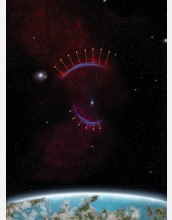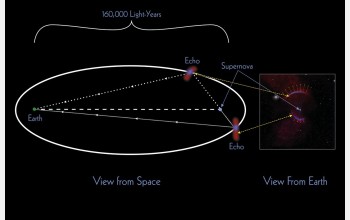All Images
News Release 05-212
Blasts from the Past
This material is available primarily for archival purposes. Telephone numbers or other contact information may be out of date; please see current contact information at media contacts.

This artist's concept portrays the appearance of a "light echo" from a supernova that exploded in the nearby galaxy called the Large Magellanic Cloud (LMC), as seen from Earth more than two centuries after the explosion. The echo is only partly visible because it must intersect with clouds of interstellar dust far from the explosion to be seen. The dust clouds are not equally spaced in the volume the supernova light expands into.
Located 160,000 light-years away in the southern constellation Dorado, the LMC is considered the closest large galaxy to Earth.
Credit: P. Marenfeld and NOAO/AURA/NSF
Download the high-resolution JPG version of the image. (279 KB)
Use your mouse to right-click (Mac users may need to Ctrl-click) the link above and choose the option that will save the file or target to your computer.

This graphic shows the geometry of the light path that creates a supernova light echo, as if the process could be viewed from the side. An echo occurs when the Earth is at one spot in an imaginary ellipse, and the supernova remnant is at another located near dust clouds.
When light from the supernova reaches the dust clouds, it is reflected toward an observer located on Earth. To the observer, the reflection appears as an arc; this arc would be a full, circular slice through the ellipse (as viewed from Earth) if dust were equally distributed in the space the supernova light is traveling through.
Credit: P. Marenfeld and NOAO/AURA/NSF
Download the high-resolution JPG version of the image. (83 KB)
Use your mouse to right-click (Mac users may need to Ctrl-click) the link above and choose the option that will save the file or target to your computer.


